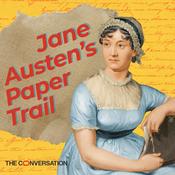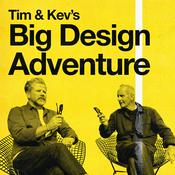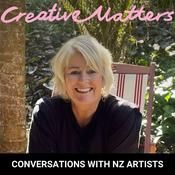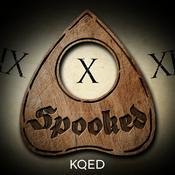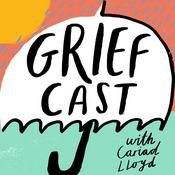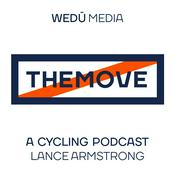Available Episodes
5 of 53
- Ephameron: 'My work is always at the crossroads between literature, graphic arts, painting, comics'This Autumn series of podcasts has already brought us Helon Habila, Caroline Clark and Kasimma. We round it off with Ephameron and her graphic short story <cloud_update>.This enigmatic comic imagines a couple divided by distance but reaching for connection by talking about the weather. So when Ephameron joined us down the line from Antwerp, we began with an update on the skies.Clouds are endlessly fascinating, the author says, "A lot of painters have been interested in painting skies and how you do the textures right."In <cloud_update>, Ephameron uses watercolours, a technique she says she first adopted when she was travelling, pairing it with a font based on the video game Minecraft."I'm an artist," she explains, "so I try and draw inspiration from a lot of different corners of the web."This broad vision, married with a background in fine arts and an ambition to tell "stories that are set in real life, that are talking about real issues", puts Ephameron's work firmly on the boundary between art and story."I really want to push the borders," she says.That's all for this Autumn season. Hosted on Acast. See acast.com/privacy for more information.--------18:06
- Kasimma: 'Because I’m writing fiction, I can get away with anything'We've already heard from Helon Habila and Caroline Clark in this Autumn series of podcasts, and we'll be rounding out the set with Ephameron in the next couple of weeks. But this time we welcome Kasimma and her short story Mama Taught Me That.This story is set in the 16th century."We are not really sure what life was like then," Kasimma explains. "After colonisation, a lot of our culture was destroyed or merged with the beliefs of the colonisers, so that we don't really – in my opinion – have the original culture and beliefs that we had then, before European intrusion."Some of the most important differences in Igboland – the homeland of the Igbo people in southeastern Nigeria – were around women's rights, she continues. "Everybody was equal. Both male and female owned land, both male and female could do the same kind of jobs. There was no 'A man is better than a woman,' or 'A male child is preferred.' All these things are just debris of colonisation."Many of the details of life five hundred years ago are lost, so there was a lot of freedom in trying to capture that world view."It's mostly just fiction," she says.Our ancestors may have been more connected with the natural and spiritual worlds, Kasimma continues, so there is a lot to learn from them. "But we shouldn't go back. I don't want to go back. I like my phone, and I like my laptop. I like the airplanes, I like the nice hotels. I love how far we've gone, as human beings, to make life easier for ourselves and to bring communication closer."Next time we'll be communicating with Ephameron, discussing the weather and her graphic short story <cloud_update>. Hosted on Acast. See acast.com/privacy for more information.--------21:10
- Caroline Clark: 'This story completely surprised me'This Autumn series of podcasts started with Helon Habila confronting the difficult legacy of slavery in the US. Over the next few weeks, we'll be talking with Ephameron and Kasimma. But this time we welcome Caroline Clark and I Will Go.Clark tells us she isn't really sure where this haunting story started."I could tell you a story about how this story came together," she says, "but it probably wouldn't be the real one."The author explains how she assembles her writing mosaic fashion, instead of a "linear, chronological manner"."I think that's what I have to do," she says, "to get my words out there – come upon something from a different angle."This mysterious process may have served her in poetry, memoir and now fiction, but she isn't hung up about genre, suggesting that her work is "all connected"."When I've written everything you'll have the video game of Caroline Clark," the author adds, "and you can play it."We'll be levelling up with Kasimma next time as we discuss history, equality and her short story Mama Taught Me That. You can find her here on the site or via Apple podcasts, Spotify, Acast and Podchaser and more. Hosted on Acast. See acast.com/privacy for more information.--------17:31
- Helon Habila: 'What fiction does is make you live the life of the other'Here in the northern hemisphere it's getting misty and mellow all over again. Time for Autumn 2025 and another fruitful harvest of podcasts, ripened to the core. Over the next few weeks, we'll be hearing from Caroline Clark, Kasimma and Ephameron. But we launch into autumn with Helon Habila and his story Paradise.Habila tells us how, after twenty years of living in the USA, in this story he's trying to "make sense of America"."History is not past," Habila says, "it's still with us, and we're living the consequences of that history of slavery in America. To even begin to understand the place, you have to grapple with that history."Paradise puts different Black experiences alongside each other – a Nigerian girl living in Northern Virginia, a young woman whose mother is Nigerian and whose father is white, and a vision of the Brazilian countryside "filled with Black people". But at the heart of the story are two twins, whose ancestors were enslaved on the Strout Estate.When they return to the house, there's "almost a beautiful symmetry", Habila says, "a cycle coming to a close"."You can only imagine that, for them, what it must feel like." To be free people, he continues, knowing their ancestors could never have dreamed of the freedoms that they enjoy today, "that's the contradiction, that's the complexity in American history and the American present, where the past is always in conflict with the present".Some people want to erase the evidence, Habila adds, to "rewrite history. They want to claim that the slaves were actually happier being slaves than Black people are today."The pressure on academics, the new boldness of people in power to say out loud what could only be said before in a whisper is "scary" he says, but he has to go on. "The only thing one can do as an artist is just to remind people and historicise these things and try to turn it into art."Next time, Caroline Clark will be talking about the inevitable pain of the writing life and her short story I Will Go. Hosted on Acast. See acast.com/privacy for more information.--------22:53
- Sheyla Smanioto: 'It's a haunted story, where you know something is going to happen'This summer series of podcasts has taken us from the snow and ice of AL Kennedy's Expedition Skills to the blunt heat of Ali McClary's Proper Magic, and from the staccato fragments of Pete Segall's Bolex Man to the unstoppable momentum of Dafydd McKimm's The Nosebleed.We bring this season to a close with Sheyla Smanioto and the haunting threat of her short story Intruder, translated by Laura Garmeson and Sophie Lewis.Speaking with the help of the interpreter Jaciara Topley Lira, Smanioto tells us that the story came to her with "almost the last sentence", in a dream where "Somebody was holding me by the throat and saying, 'Look how difficult it will be for me not to kill you when I'm choking you'."She had to deliver that sentence so that she could recreate the feeling she had in the dream, she continues, "And so that's why I needed to trick the reader sometimes."The slippery first-person plural, the sudden switches between the present and the past and the abrupt swerves into dialogue that keep the reader on their toes are also a challenge for the writer."So, in a way," Smanioto adds, "both me and the reader are victims of what the text needed."Pito's bar is midway along the great journey from the country to the city that Smanioto charts in her novel Out of Earth."It's a historical movement," the author says. "It's a movement that brought my family to São Paulo. But when you look at it as a movement, it always looks like it is made up of a mass. But it's never a mass, it's made up of people."The people who make this journey are left with a "specific type of loneliness", Smanioto continues, an emptiness that she has tried to fill with her writing by "creating a culture that was a sort of dream, a memory of the past".Even though she calls herself a "very intellectual" writer, dreams are still central to her work."I have studied technique," Smanioto says, "I'm a literature graduate. But I can't create anything if I don't feel it in my skin first." Hosted on Acast. See acast.com/privacy for more information.--------21:52
More Arts podcasts
Trending Arts podcasts
About Fictionable
Interviews, book chat and everything about the short stories and graphic fiction from all around the world appearing in Fictionable. "Storytellers, readers and creatives alike will love" – The Independent Hosted on Acast. See acast.com/privacy for more information.
Podcast websiteListen to Fictionable, 99% Invisible and many other podcasts from around the world with the radio.net app
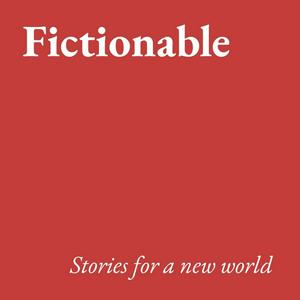
Get the free radio.net app
- Stations and podcasts to bookmark
- Stream via Wi-Fi or Bluetooth
- Supports Carplay & Android Auto
- Many other app features
Get the free radio.net app
- Stations and podcasts to bookmark
- Stream via Wi-Fi or Bluetooth
- Supports Carplay & Android Auto
- Many other app features


Fictionable
Scan code,
download the app,
start listening.
download the app,
start listening.





